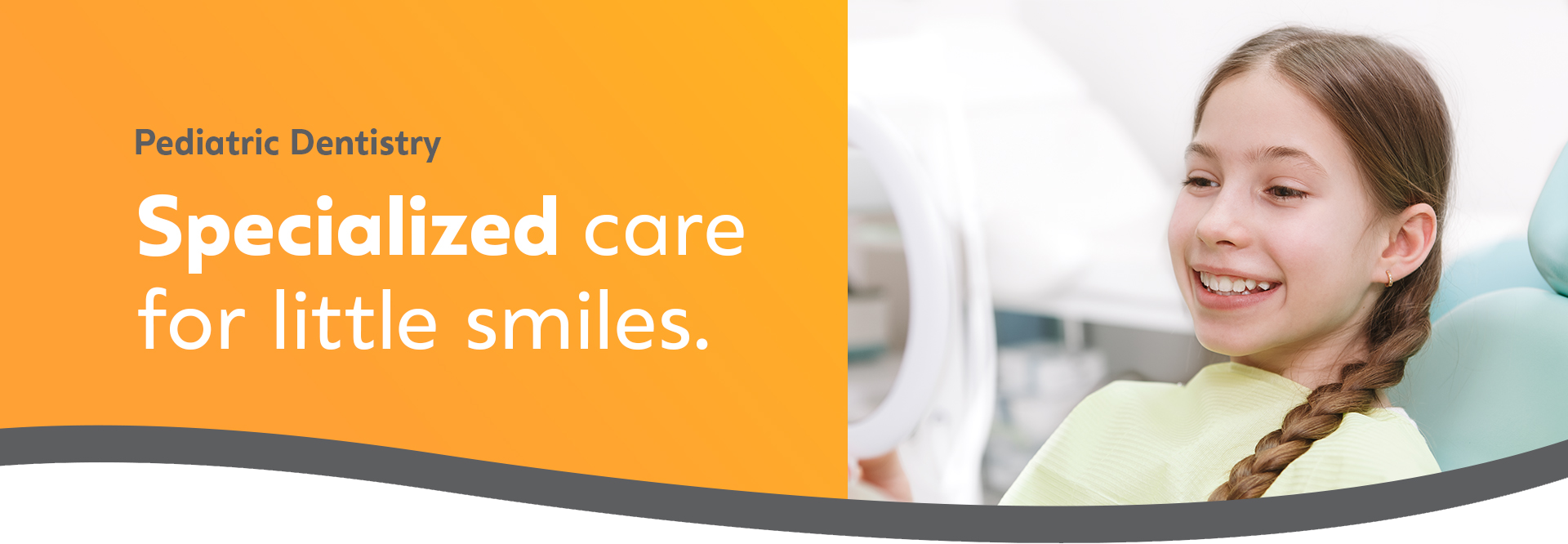
Pediatric Dentistry
Why should my child see a pediatric dentist?
In the same way that pediatricians are trained to meet your child’s medical needs, pediatric dental specialists are uniquely qualified to protect your child’s oral health. Pediatric dentistry is an age-defined specialty that provides both primary and comprehensive preventative and therapeutic oral health care for infants and children through adolescence, including those with special health care needs*. It is one of nine dental specialties of the American Dental Association.
Specialty Training
First Visit
Special Needs Dental Care
Labial / Lingual Frenectomy
Sedation Dentistry
Schedule your appointment today
Specialty Training
In addition to four years of dental school that general and family dentists are required to complete, pediatric dentists undergo additional two or three years of specialized training.
Specialized training includes but is not limited to in-depth study of
- Infant oral health
- Dental growth and development, including management of the developing occlusion
- Management of pediatric dental trauma
- Pediatric oral pathology
- Child psychology and cognitive development
- Management of patients with special needs, including patients with a variety of medical conditions
Children’s dental needs are different from those of adults
Children are not just small adults. They cannot be expected to behave like adults in a dental office. Sometimes they are scared, sometimes they do not have the patience to sit through long procedures. Because of their specialized training, pediatric dentists can help your child cope with the fear and anxiety and make them comfortable in a dental environment.
Furthermore, some kids present with concerns unique to childhood, such as finger and thumb habits, pacifier use, nail biting, etc. All these can be effectively addressed by a pediatric dentist who is trained in the most up-to-date techniques.
First Visit
Welcome To Your Dental Home
The American Academy of Pediatric Dentistry recommends…. Children should visit the dentist by their first birthday. Getting to know your teeth is fun! Studies show that children with an established dental home are less likely to suffer tooth decay, have long-lasting and positive dental health.
We encourage you to partner with us in making your first visit a comfortable and positive one. We encourage you to talk to your child beforehand, creating excitement and anticipation for a great experience. You’ll want to answer any questions your child may have and we encourage you to show your child age-appropriate children’s books on “going to the dentist”.
We cannot wait to show you and your child how going to the dentist can be fun!
Dental Care for Patients with Special Needs
Every person is unique in their own way, but handling the responsibilities that come with raising a special needs child can often feel like a juggling act for parents. All too often, pressing medical and developmental issues can force proper dental care to take a back seat – this is why studies show that children with special needs are almost twice as likely to experience oral healthcare problems. At Ridgeview, Dr. Stacey and her team have experience with these kinds of cases, and we enjoy being able to help your family members with physical, developmental, emotional, or behavioral conditions smile brighter than ever through treatment that’s always patient and kind.
Labial and/or Lingual Frenectomy
Frenectomy is the release of a frenum to allow for added range of motion. Some children are born with extra tissue called frenum under their tongue or upper lip. These are called tongue-ties and lip-ties and can cause difficulty with speech, breastfeeding, weight gain, and even dental decay. These issues can generally be corrected by a simple procedure done with our soft tissue laser.
Indications for a frenectomy include but are not limited to:
- Difficulty with nursing/feeding
- Difficulty with oral hygiene
- Difficulty with speech: lisp or trouble with certain sounds
- Inability to open the mouth wide enough for proper function
Do you need help?
Common questions regarding Pediatric Dental Emergencies
What should I do if my child’s baby tooth is knocked out?
- Contact your pediatric dentist as soon as possible
- The baby tooth should not be replanted because of the potential for subsequent damage to the developing permanent tooth
- Treatment should be directed to infection control and pain management
What to do if my child’s permanent tooth is knocked out?
- Find the tooth and holding it by the crown (avoid touching the root) rinse it gently under cold water
- Do not scrub or clean the tooth with soap
- If possible, replace the tooth into the socket immediately and hold it there with sterile gauze or a clean washcloth
- If you cannot place the tooth back into the socket, place the tooth in a clean container with cold milk, saliva, or water (in that order)
- Get to the pediatric dental office immediately
- Call ahead to announce your arrival or call the emergency number if it’s after hours
- Time is of the essence: the faster you act, the greater your chances of saving the tooth
What should I do if a tooth is chipped or fractured?
- Contact your pediatric dentist immediately
- Quick action can save the tooth, prevent infection, and reduce the need for extensive dental treatment
- Rinse the mouth with water and apply a cold compress to reduce swelling
- If you can find the broken tooth fragment, place in a container or cold milk or water and bring it with you to the dental office
What to do if my child sustained a severe blow to the head or a jaw fracture?
- Your child needs immediate medical attention!
- A severe head injury can be life threatening
- Keep in mind that an emergency medical team may be able to reach you faster than you can get to a hospital
What should I do if my child has a toothache?
- Call and visit your pediatric dentist promptly
- To comfort your child, rinse the mouth with water
- Over-the-counter children’s pain medication dosed accordingly to your child’s age and weight might be helpful
- You may apply a cold compress or ice wrapped in a cloth to the face in the area of pain
- Do not apply heat or administer aspirin!
Can dental injuries be prevented?
Your child’s risk for dental injuries can be reduced by following a few simple suggestions:
- Reduce risk of severe head or oral injury in sports by wearing protective gear, including a mouthguard
- Always use a car seat for young children and require seat belts for everyone else in the car
- Childproof your home to prevent falls and electrical injuries
- Regular dental checkups provide your pediatric dentist with an opportunity to discuss additional age-appropriate preventative strategies
What sedation options do you offer for Pediatric Patients?
- Nitrous oxide: Nitrous oxide is a gas, and is commonly known as happy gas or laughing gas. Giving nitrous oxide is a way to help reduce a child’s pain and anxiety during dental treatment. The gas is given through a small nosepiece, and your child will be awake throughout the procedure.
- Moderate sedation w/ pre-medication: Oral moderate sedation is a form of conscious sedation we may recommend to ensure your child will have a comfortable experience each time you visit our office. Administered in liquid form, oral sedation is simple and easy to use. Because oral moderate sedation is a form of conscious sedation, your child will remain awake during the treatment, but they will feel more relaxed and at ease.
- IV sedation: This involves intravenous (IV) medications to help your child sleep through the procedure. While your child may still move a little and sometimes make noises, he or she may not be able to breathe well on his or her own. We work with an anesthesia group for this form of sedation. Dr. Stacey performs dental treatment while an anesthesiologist delivers sedation and monitors your child’s heart rate, heart rhythm, blood pressure, and oxygen saturation (breathing) during the procedure and until he or she wakes up. Separation of duties between the doctors ensures your child’s safety and comfort.




